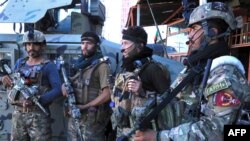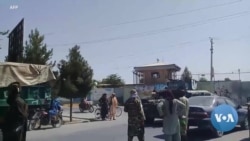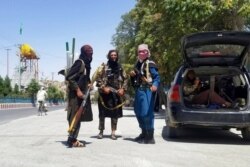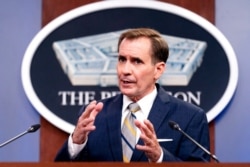Just weeks away from completing its military withdrawal from Afghanistan, the United States is sending thousands of combat troops back to Kabul in a last-ditch attempt to move diplomatic personnel and Afghan allies out of harm's way.
The move, announced Thursday by the State Department and the Pentagon, comes as U.S.-trained and -equipped Afghan security forces continue to crumble in the face of an offensive that has seen almost half of Afghanistan's 34 provincial capitals fall to Taliban insurgents in less than a week.
The first set of reinforcements, 3,000 troops from three U.S. Marine and Army battalions, were expected to arrive in the Afghan capital of Kabul within 24 to 48 hours.
An additional 1,000 U.S. military personnel are being sent to Qatar, which has been serving as a coordination hub for U.S. operations in Afghanistan during the withdrawal, to help process special immigrant visa applications for Afghans who worked with the U.S.
And another 3,500 to 4,000 troops with the U.S. Army's 82nd Airborne Division are being sent to U.S. bases in Kuwait, where they will be on standby should conditions deteriorate more quickly.
"This is not abandonment. This is not an evacuation," State Department spokesman Ned Price told reporters Thursday, admitting only a "core diplomatic presence" would remain in Afghanistan.
"What this is, is a reduction in the size of our civilian footprint," he said. "This is a drawdown of civilian Americans who will, in many cases, be able to perform their important functions elsewhere."
At the Pentagon, press secretary John Kirby said the decision to more than triple the number of U.S. boots on the ground in Afghanistan was "the prudent thing to do given the rapidly deteriorating security situation in and around Kabul."
"This is a temporary mission with a narrow focus," Kirby said of the 3,000 troops, who will be charged with securing the embassy and Hamid Karzai International Airport "to facilitate the movement of all these people over the next couple of weeks."
Earlier this week, U.S. officials said the military withdrawal was about 95% complete, and that of the 2,500 or so troops that had been in Afghanistan at the start of May, when the withdrawal began, only about 650 remained, tasked with providing security at the airport and the embassy.
U.S. officials have become increasingly alarmed about the rapid disintegration of the Afghan security forces after Taliban fighters embarked on a nationwide campaign to take key territory and provincial capitals, starting with Zaranj, the capital of Nimruz province, last Friday.
In the following days, Taliban fighters captured the capitals of Jawzjan, Kunduz, Takhar, Sar-e Pul, Samangan, Farah, Baghlan and Badakhshan provinces, in some cases without a fight.
Then, early Thursday, the insurgents took Ghazni, a strategic city on the road from Kandahar to Kabul, just 150 kilometers from the capital.
By late Thursday, U.S. officials said an 11th provincial capital, Herat, was also in Taliban hands, while Kandahar itself was "in the process of falling."
A second U.S. official, also speaking on the condition of anonymity, called the fall of Herat and the impending fall of Kandahar "significant."
Both cities had been reinforced by Afghan special forces and had been getting additional help from the U.S., whose concentrated airstrikes aimed to drive back Taliban fighters.
But the failure of Afghanistan's most capable forces and Afghan and U.S. airpower to hold off Taliban fighters in priority areas set off alarms that, barring significant developments, the days of the Afghan government in Kabul might be numbered.
And while defense officials said the U.S. would continue to support Afghan forces with airstrikes when and where they could, they said the influx of U.S. troops and the expanded presence at the Kabul airport would not mean more help for beleaguered Afghan security forces.
"There is no planning and no discussion of using Hamid Karzai International Airport as a base for conducting airstrikes," the Pentagon's Kirby said at a news conference Thursday, in response to a question from VOA.
For now, U.S. officials said they expected to start evacuating civilian personnel in the coming days, with the goal of having everyone except core diplomatic personnel out of Afghanistan by the end of the month.
The State Department said some personnel would leave on commercial flights, which continue to operate out of the Kabul airport. But defense officials said they were preparing to be called upon to evacuate some U.S. civilians as well as Afghans who have worked with the U.S., and their families, using military planes.
Earlier Thursday, the U.S. Embassy in Kabul urged U.S. citizens to "leave Afghanistan immediately using available commercial flight options" and offered help to citizens unable to leave immediately for financial or other reasons.
U.S. Secretary of State Antony Blinken and U.S. Defense Secretary Lloyd Austin spoke with Afghan President Ashraf Ghani by phone before announcing the decision.
According to a State Department readout, the two U.S officials sought to “stress that the United States remains invested in the security and stability of Afghanistan in the face of violence by the Taliban.”
Later, a State Department spokesperson denied reports the U.S. had pressed Ghani to resign, telling VOA, “Rumors indicating we have done so are completely false.”
“Decisions about who leads the country are for Afghans to make,” the spokesperson added.
Other countries were also urging their citizens to clear out of Afghanistan.
Britain on Thursday urged its citizens to "leave Afghanistan immediately."
British Defense Secretary Ben Wallace later announced he was sending about 600 troops "to support the diplomatic presence in Kabul, assist British nationals to leave the country and support the relocation of former Afghan staff who risked their lives serving alongside us."
Some American military veterans and other observers have said the rapid retreat from Afghanistan is reminiscent of the evacuation of the last Americans in South Vietnam in April 1975.
Many said they still remembered the images of helicopters pulling away from the roof of the U.S. Embassy in Saigon as the city fell to communist forces from North Vietnam.
"The Taliban is not the North Vietnamese Army," U.S. President Joe Biden said just last month. "They're not remotely comparable in terms of capability. There's going to be no circumstance when you're going to see people being lifted off the roof of an embassy of the United States from Afghanistan."
VOA's Cindy Saine and Nike Ching contributed to this report.









